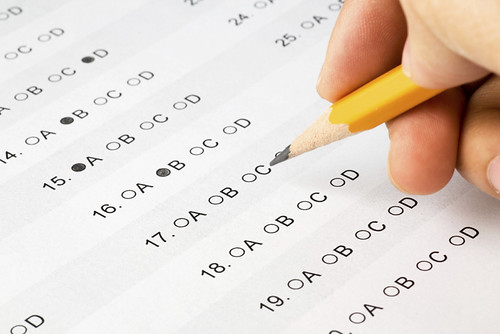 We now do a lot of teaching to the test. Making sure that kids can pass tests created by private companies to gauge achievement. It’s a huge racket. We spend billions on tests, test prep and the time wasted in our already short school year. The same people who make the tests, make the textbooks, the test prep materials, and even run charter schools take a huge share of taxpayer money to provide “services” to “public education.”
We now do a lot of teaching to the test. Making sure that kids can pass tests created by private companies to gauge achievement. It’s a huge racket. We spend billions on tests, test prep and the time wasted in our already short school year. The same people who make the tests, make the textbooks, the test prep materials, and even run charter schools take a huge share of taxpayer money to provide “services” to “public education.”
There are proven lower cost alternatives, but I’ll get to that later. First you need to be schooled about what’s on our tests.
For a brilliant perspective on this folly, you really must read about the “hare and the pineapple“- a short story adapted from the fable of the hare and the turtle. This was on a test in the state of New York and was called out by students as being dumb, and amazingly, the people administering the test agreed and threw the questions out. Unfortunately, we didn’t look at throwing the publisher of this tripe, Pearson, out of the public education support business and start investing in meaningful education reform.
Gail Collins, editorial columnist for the New York Times has a nice short piece about this “A very pricey pineapple”
The first group of people we need to test on education is the people we elect. Sarah Palin had the potential of being our vice president, yet couldn’t tell you who fought on which side in World War II. Maybe we should make candidates try to pass the basic citizenship test that we make foreigners take to gain citizenship? It’s not an easy test. Right now, Ohio Governor Copycat Kasich is in love with an idea he got from the State of Florida- that no third grader should advance to fourth grade until they are reading at level. All research says that for kids to read on level by third grade a few things are needed:
- Parents who can read and do in the home
- Books in the home
- Pre-K programs like Head Start and full-day kindergarten
However the governor has done little to assist schools in having funding for the actual parts the state provides.
Politicians talk about supporting education all the time. In fact, in his leaked website, our “Future Mayor of Dayton” talked about making sure education will be a priority, even though as mayor of Dayton, he has absolutely zero authority to do anything about education in his job description, unless he gets the state to intervene and declare Dayton Public Schools a failure and turns the headaches of urban school district reform over to the mayor as they have in Cleveland- in essence putting an amateur in charge of the education system. Maybe to run for office we should first require a test to see if the candidates actually know the responsibilities of the position and the structure of government before they are allowed to take out petitions?
It’s pretty obvious that this country has zero interest in electing our best and brightest people to positions of leadership in this country, with a few notable exceptions, we’re holding a popularity contest or an auction more than an election to select the people with the best ideas. Voters are given as little real information as possible to make selections, and the process is tainted by a lot of money spent on disinformation.
What are educational solutions that our best and brightest would advocate for? Here are two efforts that are being undertaken to help third-world nations educate their people- paid for by Americans, who don’t see it as a problem that we’re not doing the same for our kids:
Worldreader gives kids in the developing world access to digital books. Using e-readers loaded with thousands of local and international e-books, we provide children the books they want and need, so they can improve their lives.
Wow, instead of constantly having to buy new textbooks that become obsolete or that consume a ton of physical resources, we’re giving away devices loaded with knowledge that can be updated and distributed effortlessly. Giving a kid a whole library of his own to explore and engage with doesn’t somehow seem obvious to Americans for our own kids.
My own kids aren’t even allowed to bring home many of their textbooks- instead being given “worksheets” which are stupid, wasteful, fill-in-the-blank, multiple-guess and matching crapola that mimic what “the tests” look like- and of course, have to be purchased from the crack purveyors of testing materials- Pearson (et. al.).
We also talk about the jobs of tomorrow belonging to “knowledge workers” which would require absolute familiarity and expertise in working with computers. It would seem that we’d be racing to make sure that every kid had a personal computing device of their own- ideally with open source software so they could learn and tinker with the inner workings of these devices so critical to their future. Nope, we don’t have a One Laptop Per Child program universally in the United States- but, thanks to a really smart guy who isn’t elected, Nicholas Negroponte of the MIT Media Lab, they’ve developed the OLPC XO laptop, or “hundred dollar laptop” to send to poor kids in Third World Countries to solve the same problems we have here.
OLPC’s mission is to empower the world’s poorest children through education.
We aim to provide each child with a rugged, low-cost, low-power, connected laptop. To this end, we have designed hardware, content and software for collaborative, joyful, and self-empowered learning. With access to this type of tool, children are engaged in their own education, and learn, share, and create together. They become connected to each other, to the world and to a brighter future.
They are on version 2 of their device, and our kids here in America, still don’t have computers. At least not universally, provided by the “public education system” – because companies like Pearson fear for the day when they are no longer needed in the classroom, as kids learn from the huge body of information that’s freely accessible to anyone with access to the internet.
As to the question of who might be responsible for making sure that information is correct- well, let me introduce you to Kahn’s academy. It started out with a very smart guy in college, Salman Kahn, (working on his 4th degree) tutoring his cousin online. He soon started using YouTube and sharing his lessons globally. It took off. Guess what, although I previously chided amateurs running education systems it turns out some of them can. Unfortunately, see above about testing our politicians before allowing them to run.
If we elected people like Salman Kahn or Nicholas Negroponte, our education system would look a lot different. Of course, for that to happen, we’d have to have smarter voters, with better access to information… but that’s another theme that we talk about on esrati.com for another time.
For now, let’s start testing the politicians to see if they know what the leaders in educating for the future know to be true and that works at a much lower cost than what we’re doing now.
Photo Credit: Alberto G. via Compfight

Pretty good analysis, David, but a little high-falutin’ in the solutions area.
Let’s start with the goal; we want to educate children for the good of society. If we’re making it an entitlement program, where each parent gets to dictate a customized education according to their (commonly) amateur whims, then we never get to fix education. So I agree, let’s put it in the hands of the professionals. That means that we adopt such policies as no public funding for education “experiments” unless they are being conducted by scholars with a doctorate in education, psychology, or some other closely related discipline. After all, we wouldn’t want public funds for medical experiments to go to the likes of the Fordham Foundation, would we?
How can schools educate children? There’s no one-size-fits-all, but there are three clear cohorts, each with its own best approach. Cohort 1 contains the special-ed students, and we already serve them extremely well, perhaps better than any other group. Cohort B are the average students, the middle 80-85% who benefit best from small class sizes and a direct-instruction pedagogy. Cohort 3 are the brightest students, who benefit from a more self-paced, self-directed “unschooling” http://en.wikipedia.org/wiki/Unschooling approach. The sooner we adopt those pedagogies and reject the calls for innovation-for-its-own-sake, the quicker we’ll get results.
The other step will be to re-negotiate with the AFT and NEA and transition their roles away from being collective-bargaining unions into professional associations. Make them responsible for teacher licensure and age-appropriate curricula, in the same way that lawyers run the bar association and doctors make up medical boards. As much as I’d love the spectacle of politicians cramming for a mandatory political geography exam, our education system would benefit more from returning to the custom of requiring teachers to pass regular tests in their subjects.
Laptops and e-readers are great tools. But you don’t turn people into carpenters by handing them hammers, nor by teaching them a course in hammering–you create a competent carpenter via instruction from an expert carpenter.
@Truddick I didn’t suggest that technology trumps teachers, I just think that technology can save us a ton of money and put the power to learn in the hands of students better than the for profit corporate model that we’ve moved to.
I too believe that we don’t test our teachers on the subjects they teach enough. My father often told me the story of coming home from WWII and going to these giant career counseling sessions- where he heard a head of a major newspaper say “don’t study journalism, study something else- we can teach you how to be a journalist on the job”- he went and got a Masters in Political Science and learned journalism on the job.
I like your analogy about Lawyers and Doctors professional associations, however both are guilty of covering up malfeasance by their members. Solve that problem and we may be on our way to a better professional association and better teachers.
Yes- teaching has been studied, and you are right about the three cohorts- my friend David Lawrence at the Dayton Regional STEM school talks about the pedagogy of education often- and that this isn’t rocket science.
The “experiments in education” have been going on for way too long- by this point we should have a solution in place and be working on perfecting it, not still searching for a new magic bullet of the week.